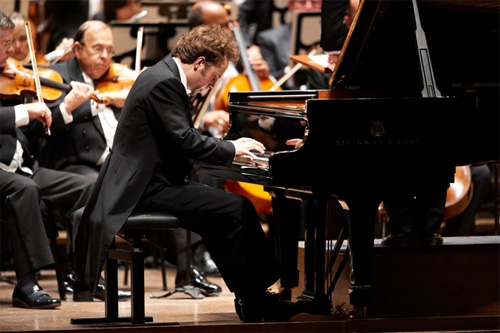By Daniel Hathaway
Cleveland, OH — August 7, 2011
By the time the Severance Hall concerto finals began on Friday evening, the four finalists in the Cleveland International Piano Competition had each played two hours’ worth of solo repertory in the previous three rounds. Now we had the opportunity to hear how well they played with others, the others of course being The Cleveland Orchestra under the Competition’s new conductor, Christopher Wilkins. There was a lot of cash attached to the outcomes, but winning the opportunity to perform with an orchestra of this stature was a prize all to itself.
Maestro Wilkins might have had to prepare four different concertos, had the results of the semifinals been different, but two finalists chose Brahms’ first concerto. 25-year old Korean pianist Kyu Yeong Kim opened with that work on Friday, while 28-year old Russian pianist Alexey Chernov played it during the first half of Saturday evening’s round. It’s a work with a tortured history, having started out to be Brahms’ first symphony, was then reworked into a piece for two pianos and finally (with new second and third movements) into a concerto for piano and orchestra. Even in its final shape, it shows signs of the composer’s inexperience as an orchestrator.
Both Mr. Chernov’s personal temperament and physical power made him a more natural match for the Brahms than Ms. Kim, who frequently struggled to penetrate through Brahms’ dense orchestral textures. Ms. Kim also chose a deadly slow tempo for the opening movement (we assume it was the soloist’s idea rather than Maestro Wilkins’), which made it difficult for her to sustain and direct melodic lines and seemed to confuse the orchestra at times (there’s no other way to account for an occasional imprecision of ensemble). So limp was the first movement that the Adagio also sounded under tempo. Liveliness finally entered the picture with the Rondo, but here, when Ms. Kim tried to play big over the orchestra, her tone got metallic instead of sonorous. But she produced some lovely playing in her solo moments, recalling performances in earlier rounds, when she proved herself to be a pianist of notable talent.
Mr. Chernov was the more seasoned concerto soloist, and ordered up a livelier tempo for the opening Maestoso on Saturday evening. His solo entrance was strong but nuanced, and he made good links with Maestro Wilkins and the orchestra, who were on top of their game tonight. Mr. Chernov turned up the emotional heat in the development, brought real excitement to the bridge to the recapitulation and ended the movement with a brilliant flourish, drawing a big but attractive sound from the piano. The Adagio had flow and direction and Mr. Chernov created a passionate cadenza over the long pedal point. The Rondo surged along with spirit and the fugue was light and cheerful. Mr. Chernov and the orchestra brought the concerto home with a thrilling march.
Friday evening’s second performer was the 26-year old American, Eric Zuber, who chose Rachmaninoff’s infallibly popular second concerto and has the chops to play everything the composer demands of the soloist — originally Rachmaninoff himself. He enhanced its famous opening chords with a subtle accelerando, then took a rather leisurely but assured voyage through the first movement. The coda was lovely. He tenderly shaped the cadenza in the second movement and, set up brilliantly by the orchestra, played the beginning of the third with fine articulation and tight rhythm. When he got hold of the famous big theme, he luxuriated in it.
Though the single line piano solo with the cymbals lost some steam, Mr. Zuber and the orchestra concluded the concerto in a blaze of pianistic and orchestral glory. The audience, some of whom of course couldn’t resist humming along with Rachmaninoff’s cinematic tunes, erupted at the end.
Saving the best for last seems to have been a sub-theme of this competition all along. Saturday evening’s performance of Beethoven’s fourth concerto by the 29-year old German pianist Alexander Schimpf was a triumph of sheer musicality as well as technical prowess. From the almost playful opening phrase by the solo piano to the final, dizzying coda, Mr. Schimpf was completely in charge of the destiny of this wonderful piece, partnering with Maestro Wilkins to create intimate conversations with the orchestra, spinning out glittering, even runs, playing subtly with rhythm but always within the beat, and expertly controlling his tone and articulation (in the slow movement, he made a thrilling transition from beautifully voiced chords to nervous drama), and his cadenzas sounded improvised, as they should. Throughout, he balanced tension and calmness with a sure hand.
Mr. Schimpf said in an interview with the Plain Dealer’s Zachary Lewis that he got to know Beethoven’s fourth concerto through a recording by Szell and The Cleveland Orchestra. It was quite obvious that he understood the ethos of the Clevelanders — that this is an orchestra that plays big works with all the attention to ensemble and detail of chamber musicians. Mr. Schimpf stood out among the finalists for his ability to play in that arena. The results were spectacular (and the standing ovation immediate and unanimous).
Christopher Wilkins deserved a solo bow of his own at the end. He did a fine job on both evenings adjusting to four different points of view and shaping coherent performances with very little rehearsal time.




